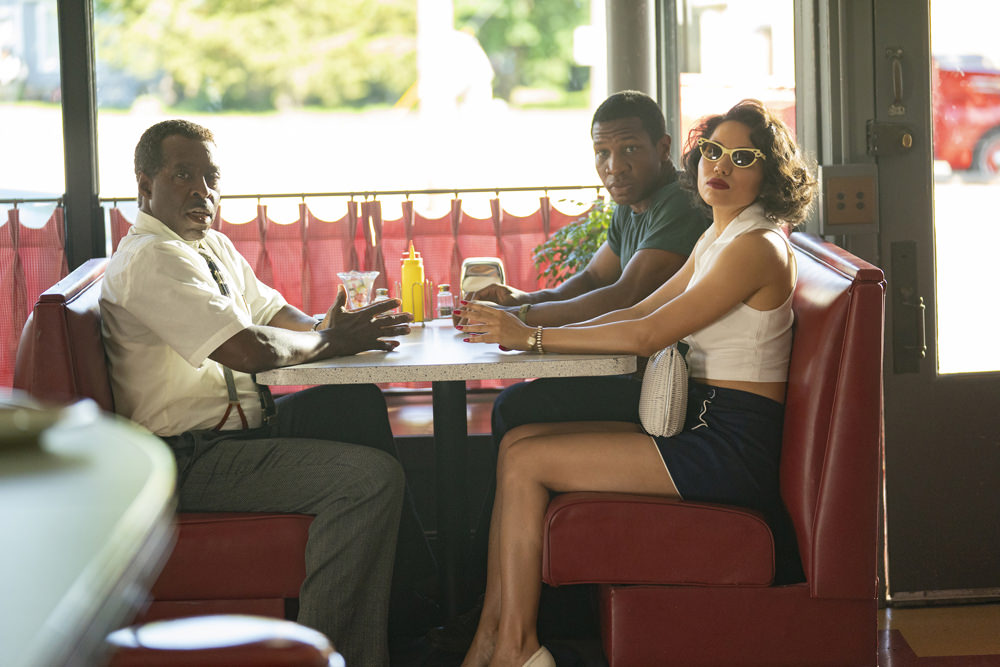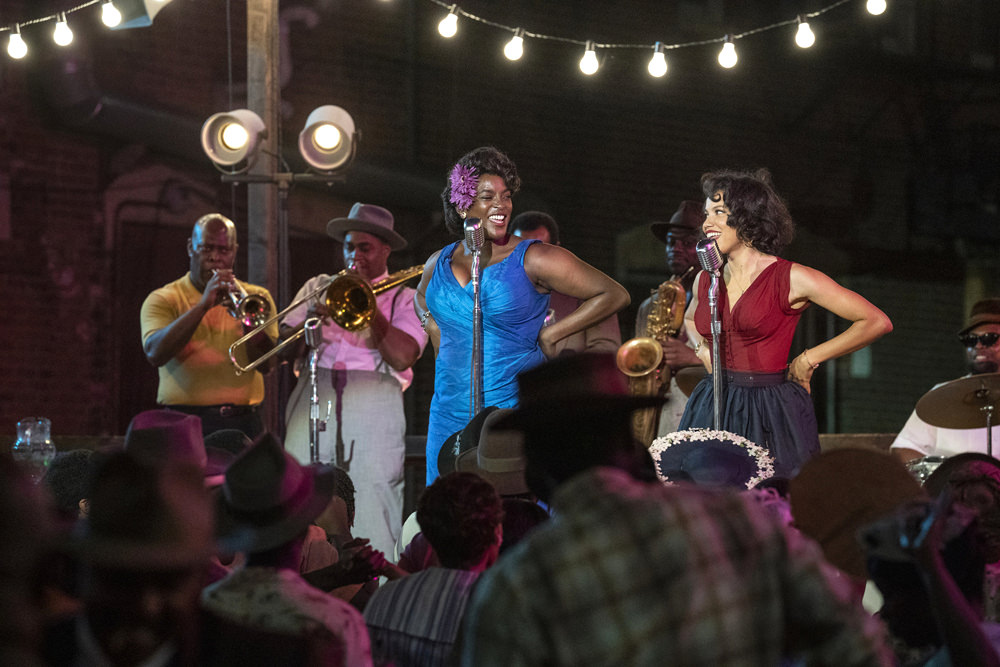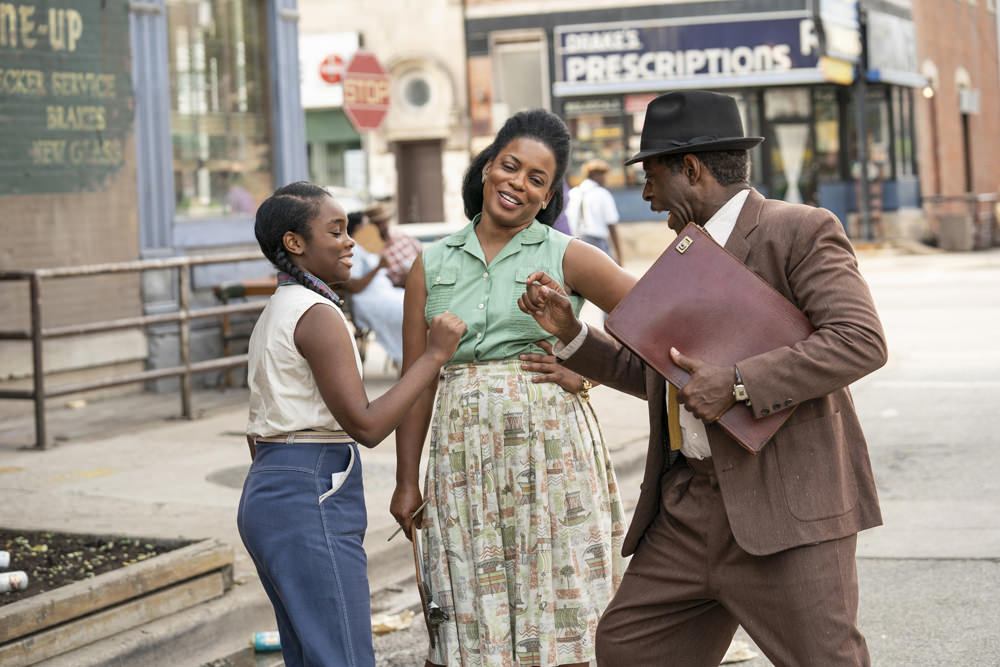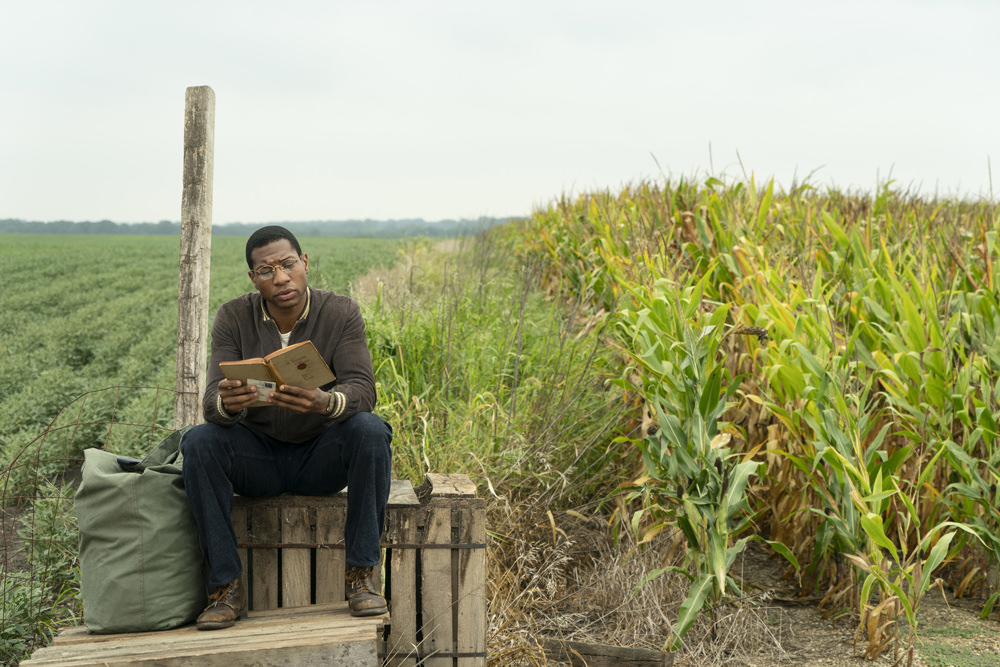
It’s possible that one of us, upon seeing the first bloody decapitation nearly an hour into the first episode of Lovecraft Country, blurted out “Oh, thank God. Monsters!” At that point, the man-eating, multi-eyed subterranean worm creatures were a welcome relief from the nightmare of racist cops with guns and no accountability. Without warning, the final ten minutes of the episode turned into a blood-spurting take on the classic “cabin in the woods surrounded by monsters” horror scenario. What surprised us most was how relieved we were to see our trio of protagonists survive the whole shitshow. It turns out we’d fallen in love with them all in the space of an hour. Make no mistake, the last 10 minutes, with the chomping and the biting and the gushing and the screaming – that was all great fun, largely because it was so perfectly acted and directed (and because the correct people were killed). But it couldn’t compare with the nightmare of the previous 15 minutes of outrunning law enforcement and local racists in small town 1955 America. Our shoulders were up around our ears from the second George, Tic and Leti entered that dinette and they didn’t relax until the last racist asshole was spurting blood from the stump where his head used to be. This was a stunning first episode and it did the job of making us salivate for what comes next.
After we watched the episode, we started talking about Hollywood, the alternate-history of the Golden Age of movies produced by Ryan Murphy and Janet Mock for Netflix. We had an extremely negative reaction to the series’ entire point, which was to take the history of the culturally disenfranchised of the early Hollywood era (Black people, queer people, women and people of color) and rewrite it to give them the kind of stories they might have had if they’d been born fifty years later. It’s not for us to say how everyone should feel about offering fictional interpreted histories of the traditionally ignored and sidelined, but Hollywood the series seemed to start from the idea that life was nothing but a string of miseries for people like Rock Hudson, who lived a closeted life for 99% of it, so writing an alternate version in which he gets to come out circa 1950 and continue his career just felt like saying the true story was “disappointing” in some way. We can’t imagine the real Rock would have been flattered by such a rewrite of his life and experiences.

The reason that disappointing series came to mind is because Lovecraft Country, in our opinion, has done what Hollywood could not. It looked at the lives of Black people in mid 20th Century America and instead of rewriting “happier” endings for them, gave them rich lives, showed an unblinking and excruciating version of the racist realities they faced, and then threw them into the kind of high adventure tales traditionally denied them. As the opening narration (from 1950’s The Jackie Robinson Story) intones, “This is the story of a boy and his dreams, but more than that, it is the story of an American boy, in a dream that is truly American.” We are then plunged directly into the most American of stories, an old-timey black-and-white war movie scene, except every soldier is Black. Then it’s a Burroughs/Welles/Lovecraft hybrid of spaceships and hell-mouthed monsters and space princesses, except again, the hero is Black. From the very first seconds of the episode, we’re being shown that this is a series about placing Black people at the center of stories in which they have almost never been centered – if they even appeared in them at all.
But this is no alternate history of the Black American experience of the late Jim Crow era. The realities of mid-20th Century apartheid are enforced in every scene, in ways large and small. From sundown towns to separate entrances; from white teenagers making monkey sounds under Aunt Jemima billboards to abusive cops looking for a reason to put a bullet into any Black person who passes through their town; from sitting in the back of the bus as it goes over “another bridge named after some dead slaveowner” to meticulously planning every detail of a road trip, knowing that a car full of Black people cannot afford to be caught anywhere without some sort of backup plan. This episode was very good about depicting the large and small ways living in a white supremacist state affects the lives, choices and behavior of Black people. The knowing laughter of two strangers; the only Black people on the bus. The casual but sharp conversations about where you’re allowed to live, where you’re allowed to apply for a job, what kinds of dreams you’re allowed to have for yourself. The suspicious glances from white people on the street. The total disregard from service workers. It’s oppressively portrayed – in every sense of the word. Inescapable and inevitable.

But the show does not make the mistake (as Hollywood seems to have done) of assuming that these are the lives of miserable people in a sad story. These are rich, full, beautiful lives full of art and music, words and pictures, family and friends. Lovecraft Country can get away with somewhat cliched horror tropes by virtue of its focus on Black characters, but it becomes something so much richer when it moves past the idea of merely inserting Black faces into standard horror stories and indulges in the idea that horror provides the perfect genre framework to center Black lives and families, Black cultural and social traditions. The Freeman family is introduced by a montage of family pictures stretching back generations (and including Mary Church Terrell) and we get a slow, intimate introduction to all of them. The sound track ranges from Tierra Whack’s “Clones” to Etta James’ “I Just Want to Make Love to You” to The Chords’ “Sh-Boom” to James Baldwin’s remarks during his debate with William F. Buckley. There are homages and visual references to Sister Rosetta Tharpe, Gordon Parks’ “Department Store, Mobile, Alabama,” The Edmund Pettus Bridge, Margaret Bourke-White’s “The Louisville Flood” and Jackie Robinson – and we’re sure our white asses missed a whole bunch of other ones that we can’t wait to hear about.
Alongside the deep exploration of African-American history and culture are just as many nods to nerd culture. Lovecraft Country doesn’t just center Black people in stories normally denied them; it depicts all of its main character as people deeply invested in nerdy, scientific, or artistic pursuits, whether it’s George’s love of horror stories or Tic’s love of classic science fiction or Diana’s love of comic books or Leti’s membership in the South Side Futurists and Science Fiction Club or Hippolyta’s astronomy – everyone is intellectually or artistically inclined in some way; a community of artists and travelers, singers and writers, star-watchers and photographers. Diana and Hippolyta are, of course, also the names of Wonder Woman and her mother. The richness of their lives is a joy to watch, making the scenes of their terror – both supernatural and all-too-depressingly natural – excruciating to watch.

It is also just straight-up gorgeous to look at. The art direction and costume design are easily some of the best period work on television right now. Everything feels so correct; so lived-in. Everyone has so much style. Leti’s wardrobe is gorgeous. Ruby’s blue dress is gorgeous. Even the car is gorgeous. And just as we could have watched that block party scene all night, we could have easily watched an hour of Courtney B. Vance, Jurnee Smollett, Jonathan Majors, Aunjanue Ellis and Wunmi Mosaku just sitting around talking about themselves. The cast is that good. Lovecraft Country is beautiful to look at and wonderful to listen to, with a bright cast, a sharp style, and a commitment to depicting the full richness of Black lives and the harsh realities of white supremacy. And it’s scary-fun high adventure, to boot.
[Photo Credit: Elizabeth Morris/HBO]
Meghan Markle at The 19th Represents: On Race & Gender Next Post:
Yea or Nay: Moschino Bouclé and Denim Coat
Please review our Community Guidelines before posting a comment. Thank you!



